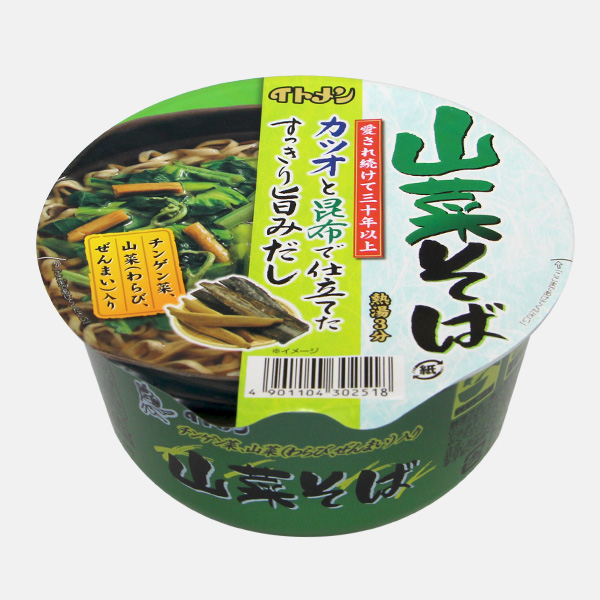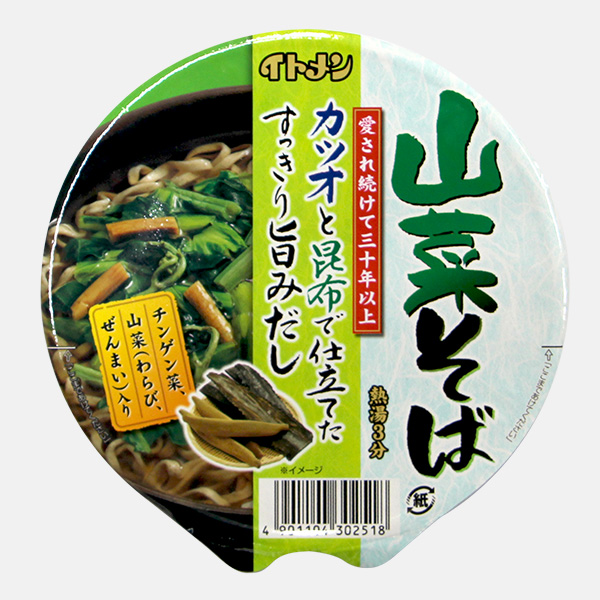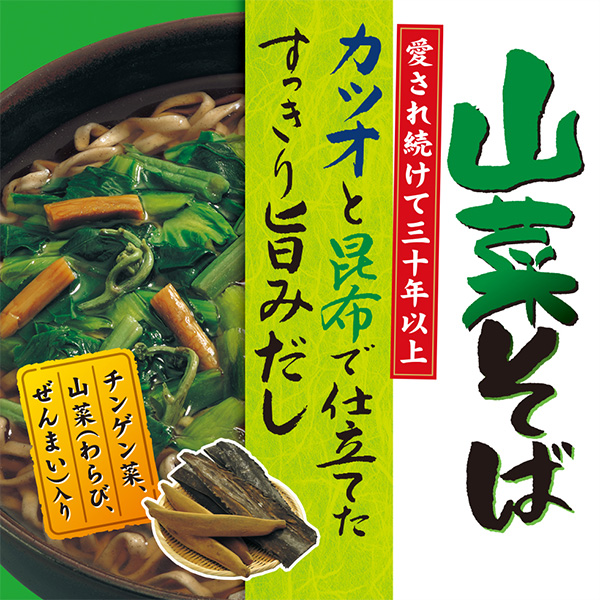Cup Sansai Soba
Bonito and kelp broth.With bracken, royal fern, and bok choy.
- Manufacturer code
- 002330
- Contents
- 78g
- Amount of noodles
- 65g
- Release date
- February 2020
- JAN code
- 4901104 302518
- JAN code for box sales
- 4901104 302624
- ITF Code
- 0214901104 302513
- Standard
- 78g x 12 x 2
- Product size(mm)
- 145 x 145 x 70
- Box size(mm)
- 445 × 300 × 150
- expiry date
- 6 months
- Gross weight per box
- 1.4kg
- Product weight
- 90g
- Suggested retail price
- 236 yen
- Wheat
- Buckwheat
- Eggs
- Milk constituent
- Peanuts
- Shrimp
- Crab
- Pork
- Chicken
- Beef
- Squid
- Salmon
- Mackerel
- Salmon roe
- Abalone
- Soy
- Yam
- Walnuts
- Matsutake mushroom
- Apple
- Orange
- Banana
- Peach
- Kiwi
- Gelatine
- Sesame
- Almonds
- Cashew nuts
- Energy
- 343 kcal
- Protein
- 9.3g
- Lipoid
- 13.4g
- Carbohydrates
- 46.2g
- Salt
- 4.6g(1.6g noodles, 3.0g soup)
Per serving (100g)
Fried noodles (wheat flour (manufactured in Japan), buckwheat flour, vegetable oil and fat, vegetable protein, salt), seasoning (salt, sugar, powdered soy sauce, bonito extract, kelp powder, yeast extract, shichimi chili pepper, bonito powder, powdered mixed dried bonito), seasoning (bok choy, bracken, royal fern), processed starch, seasoning (amino acids, etc.) Seasoning (amino acid, etc.), thickener (guar gum), emulsifier, caramel color, antioxidant (vitamin E, vitamin C), acidulant, pH adjuster, calcium lactate, (contains wheat, buckwheat, dairy ingredients, mackerel, soybean, sesame)
However, in the same production process, we handle food products that contain eggs, shrimp, crab, squid, chicken, pork, beef, yam, gelatin, and fish sauce (seafood).
| Raw materials | Main country of origin | Final processing place |
|---|---|---|
| [Noodle] Wheat flour | Japan, USA, Canada, Australia | Japan |
| [Noodle] Buckwheat flour | China | Japan |
| [Toppings] Bamboo shoot | China | Japan |
| [Toppings] Bok choy | China | Japan |
| [Toppings] Flowering fern | China | Japan |
| [Toppings] bracken | Russia | Japan |
- The following is a list of possible regions for use. ( As of July, 2015) We use the most suitable combination of regions depending on the circumstances of the raw materials.
- The main sources of raw materials are listed in no particular order, regardless of whether they are used in large or small quantities, or late or early.










